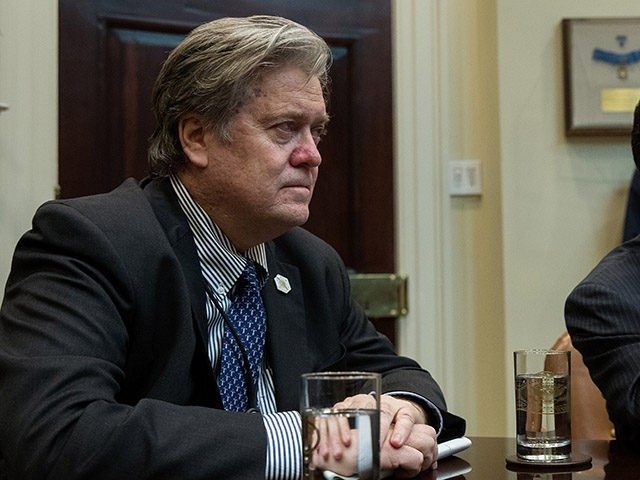When Breitbart News Executive Chairman Stephen K. Bannon sat down last month for an interview in New York City with Keith Koffler, author of Bannon: Always the Rebel, the future of America’s relationship with the People’s Republic of China was a major topic.
“Our elites have not just been okay with [the rise of China], they’ve helped exacerbate that rise … by telling us from day one that as China got wealthier, they become more liberal democratic and free-market capitalist,” Bannon told Koffler.
Instead of adopting the global liberal values of America and the West’s elite, Bannon argues, the leadership of Red China see their own “Confucian, mercantilist, authoritarian” model as the “way of the future.” He cited Chinese President and Communist Party General Secretary Xi Jinping’s latest speech to the Chinese Communist Party conference in which he laid out China’s goal to overtake the United States in several key industries and replace the dollar as the world reserve currency in the next three decades.
Bannon began to characterize the China challenge by explaining that there is a “concept among our elites … called the ‘Thucydides Trap,'” a reference to the Classical Greek soldier and author of the History of the Peloponnesian War, a pillar of the Western Canon.
In the fifth century before Christ, as Thucydides put it, “The growth of the power of Athens, and the alarm which this inspired in [Sparta], made war inevitable.” The relatively declining Sparta used its Peloponnesian League to attack the rising power of Athens and its Delian League to maintain its place as the most powerful of the Classical Greek city-states. The resulting 27-year war is among the most celebrated of Western history and resulted in a Spartan victory and the end of democratic Athens as a great power in the Aegean.
The analogy of the “Thucydides Trap,” as expounded by Graham Allison in a book economist and author David P. Goldman once described as “really dreadful,” is that one great power declining relative to a rival, rising one leads towards war between the two by pure non-ideological mechanism of power politics.
The most prominent example in modern times is Germany’s rapid rise to overtake the United Kingdom and become the industrial leader of Europe in the late 19th and early 20th Centuries. The Thucydides Trap theory would suggest the seemingly inevitable German eclipse of British naval supremacy drove the two powers inexorably towards conflict, as World War I’s outbreak in August 1914 would appear to validate.
A Soviet Union supposedly rising relative to the United States, however, never turned the Cold War “hot” as the most pessimistic of Thucydidean theorists feared.
Today, the Thucydides Trap framework is increasingly deployed to describe America’s relationship with China, including within the administration. A likely conclusion from it would be to manage the rise of China in such a way as to avoid confrontation.
Bannon slammed this thinking, noting that working class and middle class Americans do not share the same stakes in “managing” China’s rise to economic hegemony. “It’s quite evident, and Pat Caddell and I talk about this a lot,” Bannon explained, “that America’s elites are quite comfortable with managing America’s decline.”
The fate of the globalist class, Bannon argues, is no longer tied to the fate of the nation. Chinese hegemony substituted for American will not disrupt that class’s goals. “For the elites, that [American] decline can be just as comfortable as the rise,” he told Koffler.

COMMENTS
Please let us know if you're having issues with commenting.